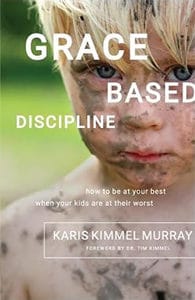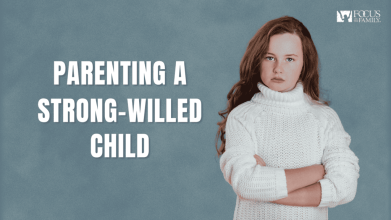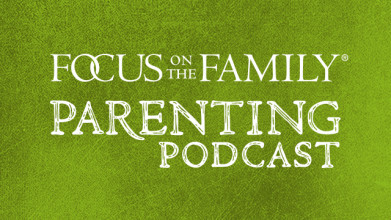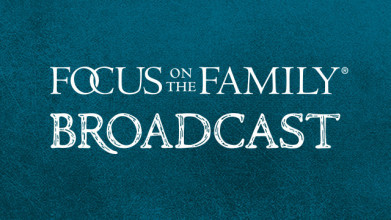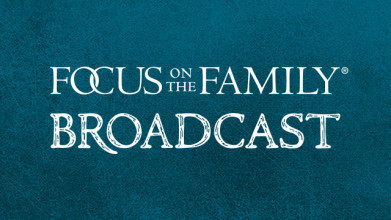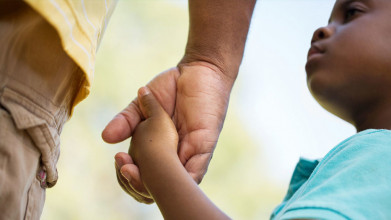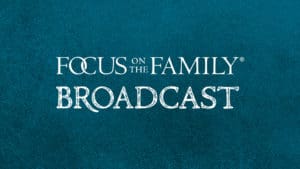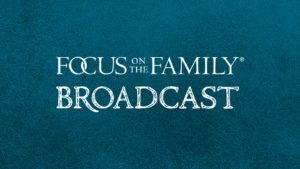Mrs. Karis Kimmel Murray: And it was just her form of protest.
John Fuller: (laughs)
Karis: She was all done. She knocked all those shoes off of, you know, the aisles. And it looked like a bomb went off-
John: Man.
Karis: … in the shoe department at Walmart. And I just-
John: That’s terrible. (laughs)
Karis: … stood there and I went, this, this is not something that I’ve ever read about in a parenting book.
John: Right.
Karis: I don’t know what to do.
John: Well, hopefully you haven’t had a toddler meltdown in the store. Uh, our guest on Focus on the Family, Karis Kimmel Murray has, and she’ll have some ideas on what to do in those situations and how to handle your kids, even when they’re at their worst. Your host is Focus President and author, Jim Daly, and I’m John Fuller.
Jim Daly: Kids at their worst just doesn’t happen, John.
John: Not in my household, never, no.
Jim: I’ve never had that experience. (laughs)
John: It’s at somebody else’s house.
Jim: Hey, you know today we do, this is our heart. We wanna equip you as a mom or a dad to do a better job and I hope you have an appetite. I believe you have an appetite like, like we do, to want to do a better job in raising our kids. How to figure out, uh, how to be a little more effective in our parenting.
You know, Hebrews 12:6, it says, “For the Lord disciplines the one He loves.” And I think that’s wonderful. It’s a powerful reminder that we need to respond to our kids the way God responds to us.
John: Mm-hmm.
Jim: There’s such a parallel in parenting between our relationship with God and then how we parent our children. Uh, here at Focus, we wanna be that daily resource for you in your parenting journey, and to be here for you. So call us if you need us and we’ll have more information about that.
John: And one great resource, Jim, that we have is Karis’s book. It’s the subject of our conversation today. It’s called, Grace Based Discipline: How to Be at Your Best When Your Kids Are at Their Worst. And this is fantastic resource with age appropriate advice for parenting that you can apply to your own family right today.
Learn more about Karis and her book. Uh, just give us a call, 800, the letter A, and the word FAMILY. Or you can find details at focusonthefamily.com/broadcast.
Jim: Karis, uh, welcome to Focus on the Family for the first time.
Karis: Hi. Thank you so much for having me.
Jim: (laughs)
Karis: We’ve had your mom and dad, Dr. Tim Kimmel on, and Darcy, your mom. And wonderful. I love their theme on grace-based parenting, and now you’re following up and going a little deeper specifically with grace-based discipline. It’s s- running in the family, isn’t it?
Yes. Yeah.
Jim: (laughs)
Karis: Yeah, I mean, our, our ministry, “Family Matters,” uh we have one channel, and that one channel is grace.
John: Mm.
Karis: And we just love to see, um, hearts transformed by the power of God’s grace and then for that transformation to extend to all of our relationships, whether that’s with our spouse-
Jim: And I think it’s wonderful.
Karis: Yeah.
Jim: I mean, I really do.
Karis: Yeah. Yeah.
Jim: Now, let’s get to it. You believe parents have something to learn from firefighters. Okay, everybody’s going, “What?”
Karis: (laughs)
Jim: (laughs) What … Firefighters. What can we learn in our parenting role from firefighters?
Karis: Well, uh, actually my brother is a firefighter with the Phoenix Fire Department. And so, you know, I, I saw a lot of parallels, um, with parenting because honestly, our kids’ behavior very often creates a- an emergency situation. (laughs)
Jim: Right. (laughs)
Karis: Uh, in our homes. Uh, you know, may be physically an emergency situation, but I mean more emotionally. And, um, they just do stuff that just lights us up, lights a fire under us. And, um, and so we need to function like first responders. We need to be able to be calm and approach those situations with our kids the way a firefighter approaches one.
And, and something I didn’t know but that my brother taught me is that, uh, firefighters never run into a burning building.
Jim: Mm.
John: Mm.
Jim: You would think that they do, and-
John: Right.
Karis: … and we see that on TV, so we just assume they r-, you know, come out of the truck and they run straight in. And that’s really not how it goes. I mean obviously, they’re, they are in a hurry. They’re trying to be fast but they’re wearing all their gear, and they also don’t always know exactly what they’re coming into.
So they’re taking their time to approach the situation, to assess what’s going on, to make sure that they don’t expend themselves before they’re even, uh, in it.
John: Mm.
Karis: And, um, and that way, once they’re in the building, they can rescue who needs rescued. They can get the fire put out. They can respond instead of react.
Jim: And the analogy there is for the parents to, you know, walk briskly.
Karis: Right.
Jim: Don’t run into-
Karis: Right.
Jim: … a calamity. (laughs)
John: (laughs)
Karis: Right. Don’t run into a calamity.
John: (laughs)
Karis: Walk briskly. Obviously, we have to respond quickly, and sometimes with our kids that’s split second. But I guess I mean, I- I’m using it as a, as a metaphor for-
Jim: Yeah.
Karis: … how we have to keep our emotions in check.
Jim: You in fact had a Walmart experience that brought you, I think to your knees a little.
John: Mm.
Karis: (laughs)
Jim: What, what, you, you tell yours, I’ll tell mine. (laughs) Go ahead-
Karis: Okay. (laughs)
Jim: … with your Walmart experience. (laughs)
John: (laughs)
Karis: Well, my girls again were, were younger. I think a lot of this stuff, you know, hits you hard on the front side of kind of the heavy lifting years of parenting-
John: Right.
Karis: … which is when they’re-
Jim: Do you … I- is it because-
Karis: … you know, babies and toddlers.
Jim: … moms, particularly, are tired and, you know, maybe-
Karis: For sure.
Jim: … dads too. But moms-
Karis: Yeah, moms-
Jim: … I think carry that load. I mean, it’s-
Karis: Moms and dads are tired.
Jim: … just a lot.
Karis: And the … Developmentally where the kids are, they just need everything.
Jim: Yeah. (laughs) That’s right.
Karis: They need everything done for them.
Jim: Yeah.
Karis: They’re learning everything. And they need correction in everything because that’s the only way that they, you know, form their personalities and their selves into, you know, contributing (laughs) members of society. And they’re definitely not that when they, when they’re two-year-old’s.
And so, uh, I think my youngest one was … She was still in like a, in a baby carrier and my older one was two. And, uh, we’d been sick for like five weeks and we were out of everything-
Jim: (laughs)
Karis: … you know, in our home. We had no groceries, we had no toilet paper, we had no-
Jim: Ah.
Karis: … nothing. So we just needed everything. So, um, you know, I psyched myself up to go on this run with both of my kids by myself to Walmart and I was spent ’cause I’d been sick as well. And so I … I mean, I had them in the cart and my strategy was just to literally run through Walmart as fast as I could, grab everything … I mean, it was like Supermarket Sweep. Remember that old, you know-
Jim: Yeah. We know that feeling.
Karis: … show? And trying to just get it done. And, um, it would have been fine, I would’ve been successful except that my older one just really, really hated to be restrained. Um, I just in a moment of weakness … I’m like, “Yeah, you can walk.” You know, “We’re almost done.”
Jim: (laughs) And she’s two?
Karis: She’s two. “Yeah, you can walk.”
Jim: (laughs)
Karis: Which all the veteran moms and dads are hearing that going, “Yep, that’s where you went wrong, right there.”
Jim: Yeah.
Karis: So I’m running through, getting everything and, um, my flip-flop broke.
Jim: (laughs)
Karis: I live in Phoenix, Arizona and, um, we wear flip-flops pretty much year round. My flip-flop had broken so I had a flat and, um-
Jim: (laughs)
John: (laughs)
Karis: … I would have just probably dealt with it and just had one shoe on and walked out to my car, except for the fact that it was July in Phoenix and the asphalt is probably-
Jim: Yeah. Burn your feet.
Karis: … 300 degrees.
Jim: Right.
Karis: You know, and I woulda burned my foot. And so, um, I was like, “Well, at least I’m at Walmart. I can go buy some shoes.” And so I’m like, “The last thing I’m gonna do, grab some sandals. I’ll buy the first pair that I find. I don’t care how ugly they are.
Jim: Right.
Karis: And then we’ll check out and we’ll go home.” And so we were in the shoe department and she just … she was all done. And so she stood on one end of an isle of shoes and she put her two little arms out to, to each side. And they were long enough that she could stand on one end of the, of the isle, she could walk to the other side and knock all the boxes of shoes down-
Jim: On both sides?
Karis: … on both sides. Just g- g- g- g- g- g- g-
Jim: That’s quite a mess. (laughs)
Karis: You know, she’s like walking. And it was just her form of protest.
Jim: (laughs)
Karis: She was all done. She knocked all those shoes off of, you know, the aisles and it looked like a bomb went off-
Jim: Man.
Karis: … in the shoe department of Walmart. And I just stood there-
Jim: That’s terrible. (laughs)
Karis: … and I went, “This, this is not something that I’ve ever read about in a parenting book. I don’t know what to do,” you know?
Jim: Right. So what did you do? Did you just go, “Uh, a spill on aisle four. I got to leave?”
Karis: Well, it’s one of those situations where you run through scenarios in your head and you think like, “How quickly could I run out of the store carrying these two kids like a football?
John: Just abandon the cart-
Karis: You know, just like a football on each side.
Jim: Yeah. Yeah. (laughs) Abandon the cart and everything.
Karis: So get in the car and get out. Make my husband go-
John: Just abort. (laughs)
Karis: Abort.
John: (laughs)
Karis: Yeah. (laughs)
Jim: (laughs)
Karis: Make my husband go later, um-
Jim: The mission is over.
Karis: And, uh, I was like, “Well, I can’t do that,” and so you know-
Jim: So you had to check out.
Karis: I … We- we did get through checkout but-
Jim: That’s a brave mom right there.
Karis: (laughs) But, uh, yeah-
Jim: So when you look at it, let’s move into the grace-based discipline aspect of this again because I think temperament plays a role in this, uh, in terms of-
Karis: Mm.
Jim: … makeup of mom and dad. Um-
Karis: Yeah.
Jim: You know, some parents and some people are rule followers-
Karis: Mm-hmm.
Jim: … and that’s very important to them.
Karis: Yeah.
Jim: And others are maybe like your daughter knocking shoes off the aisle.
Karis: Yeah.
Jim: But they’re like 23. (laughs)
Karis: Yeah. Yeah.
Jim: Not so much into the rules.
Karis: Yeah.
John: Mm-hmm.
Jim: H- how does that play into the grace-based approach of discipline and define it for us-
Karis: Mm-hmm.
Jim: … and then we can get into all that.
Karis: Well, grace-based parenting and grace-based discipline is simply treating our kids the way that God treats us. And we know that God disciplines us because it says so in the Bible. Um, and so we’re just simply following the example that God sets with his children because that’s what we are. We’re God’s children. He’s our parent and so-
Jim: Now, I hear that. Describe it for me.
Karis: So-
Jim: How God disciplines us.
Karis: So … Well, God … I mean, God approaches his relationship with us… It’s all because of grace. I mean, the only way we’re able to have a relationship with a holy God is because of grace. And so when he disciplines us he’s doing it for our good.
Jim: Mm.
Karis: It’s not about him punishing us. There’s a huge difference between punishment and discipline and I go into that in my book, but-
Jim: Punishing is often out of vindictiveness or anger.
Karis: Right, right.
Jim: Um, where, yeah, the grace-based approach is out of love for the person.
Karis: Out of love for the person.
Jim: But it doesn’t … To the critic who’s going to say, “Uh, that’s just too soft.”
Karis: Yeah.
Jim: You know, especially those dads that can be pretty heavy-handed.
Karis: Mm-hmm.
Jim: And not to stereotype. I get it.
Karis: Mm-hmm.
Jim: But oftentimes the temperament of the hard style-
Karis: Yeah.
Jim: … is with the dad.
Karis: Yeah. Yeah.
Jim: “I do it because I said to do it.”
Karis: Yeah. Well, we have to balance rules and relationships. You know, that, that’s really, really important. Um, and I think Josh McDowell said rules without relationship leads to rebellion.
John: Mm. Yeah. We’ve seen that.
Karis: And then-
Jim: It’s a great-
Karis: Which is so-
Jim: I, I use that often.
Karis: It’s a great quote. Um, and, uh, and my dad, Tim Kimmel, kind of have has expanded on that and he says, “But a relationship without rules leads to resentment.”
Jim: Mm.
John: Mm.
Karis: So we’ve got to have both.
Jim: Yeah. That’s good.
Karis: If we don’t have boundaries with our kids they resent us because that … it doesn’t prepare our kids for the life that they’re gonna face someday. For the world that they’re gonna face, if they don’t understand how to respond to authority, how to follow rules, how to have, um, you know, self-discipline in their life.
Jim: Yeah.
Karis: So we’re not, we’re not being gracious when we don’t have rules and boundaries for our kids and grace does not mean a lack of rules because that’s not how God treats us.
John: Mm. Well, this is Focus on the Family with Jim Daly and our guest is Karis Kimmel Murray. And she’s got a great book which captures much of what she’s talking about, uh, today with us. It’s called, Grace Based Discipline. And we have copies of that here. Give us a call. We’ll tell you more. 800, the letter A, and the word FAMILY. (800) 232-6459. Or stop by focusonthefamily.com/broadcast.
Jim: Karis, you mentioned a tactic in the book which I found-
Karis: Mm.
Jim: … a little interesting and I want you to expand on it. You talk about putting things in the basket.
Karis: Mm.
Jim: Kinda the… I think the bad behavior, the poor behavior-
Karis: Yeah.
Jim: … whatever it might be. What are you getting at to help parents understand to put those bad things in a basket?
Karis: Yeah. Yeah. That’s right in the intro of my book because I feel like it’s a first step-
Jim: Mm-hmm.
Karis: … um, before you do anything else. And this goes back to what we were talking about with firefighters and being able to respond and not react. You’ve got to get your emotional reactions under control before you can really think.
Jim: Yeah.
Karis: Before you can analyze and respond. And so what the basket exercise is, is, you know, you imagine a basket or some kind of a container and I like to, you know, visualize my kid. The things that they’re doing that are annoying you or bothering you or that are wrong or that are hurting you. Whatever it is, I imagine those behaviors almost like weights that are hanging off of my kids.
Jim: Uh-huh.
Karis: I see them as external, right? Um-
Jim: It’s not their heart.
Karis: It’s not their heart. Right.
Jim: Right.
Karis: We’re separating their behavior from their heart. And so the way you do this is you just imagine those behaviors hanging off your children like weights and then you imagine yourself one-by-one, you know, name it. Uh, being untruthful or talking back or hitting their sister. You just imagine those things and you pull them off of your kid. You put ’em in a basket and then you walk that basket into another room and put it up on the shelf.
Jim: What does that benefit you, the parent?
Karis: Well, the- the way that it benefits you is that it emotionally removes the threat.
John: Mm.
Karis: Because we go into sort of a fight or flight response a lot of the time in situations with our kids. When our kids have knocked all the shoes off of the isle in Walmart.
Jim: (laughs)
Karis: We’re embarrassed, we’re angry, we’re annoyed. We just … It kinda lights us up. And that would be a reaction. And very often our own emotions and reactions are gonna steer us towards what’s best for us-
Jim: Yeah.
Karis: … not what’s best for our kids. So-
Jim: So true.
Karis: So when you remove those you can separate the behavior from their heart and really see them-
Jim: Yeah.
Karis: … for who they are.
Jim: And, and what I like is how you tie that then to the long view. This is probably, for me … And I don’t, don’t know about you, John, but this is the aha in my parenting experiencing.
Karis: Mm.
Jim: And I feel like I’ve finally got it. And that is to take the long view.
Karis: Yeah.
Jim: And you talk about that in your book by thinking 10 years down the line with that behavior-
Karis: Yeah.
Jim: … that they’re expressing.
Karis: Yeah. Right.
Jim: And you need- you need to absorb some of that.
Karis: Right.
Jim: And certainly deal with it and talk about it-
Karis: Yeah.
Jim: … and especially in a spiritual context. But it’ll take some of the sting out of it if you think about, “Are they gonna be doing this at 30?”
Karis: Yeah. Yeah.
Jim: Probably not.
Karis: Yeah.
Jim: And that’s the key, isn’t it?
Karis: That’s the key. Yeah, my, my dad has a great line that he says. Never drive in a thumb tack with a sledgehammer.
Jim: (laughs)
Karis: He used to always say that to us when we were kids and-
Jim: That’s good.
Karis: … I’m like, “I do not understand what this thing means,” you know? But then once I had kids I got it. Um-
Jim: Yeah.
Karis: It’s really easy to overreact to things that aren’t that important-
Jim: Yes.
Karis: … or to under react to things that are really important.
Jim: For the parents who have not caught that idea of grace, I guess there’s two parts to this question. One is we can only dispense grace if we know grace.
Karis: Yeah.
Jim: So I … Speak to that.
Karis: Mm.
Jim: And then secondly, how do you know you’re struggling?
Karis: Mm.
Jim: That you’re not blind. That you don’t have a blind spot.
Karis: Mm-hmm.
John: Mm.
Jim: You think you’re grace-filled but-
Karis: Mm-hmm.
Jim: … you’re actually more rules oriented.
Karis: Yeah.
Jim: How do you take a quick self-assessment? So those are two big questions.
Karis: Two big questions. So the … Well, let me answer the first one first. I think a great Biblical definition of grace is getting something that we desperately need but don’t necessarily deserve.
Jim: Right.
Karis: And so … And God gives us that. I mean, Christ’s death on the cross and his payment for our sin, we don’t deserve it. We don’t deserve to have a relationship with a holy God based on our own merits even if we’re, you know, quote, unquote, good people. We’re not perfect. Um, and so we receive that grace from God because he said, “I’m not going to judge you based on your sin. I am going to allow my son’s righteousness to be, um-
Jim: Sufficient.
Karis: … laid over top of you. To be sufficient for you. And so that’s, that’s Biblical grace. And it doesn’t mean that there are no rules and that God doesn’t want us to obey him. Of course he wants us to obey him. He’s a good Father. Um, but he doesn’t want us to be obey him for his sake. He wants us to obey him for our sake.
Jim: And for our love for him.
Karis: And, and for our- and, and out of love for him, yeah, as a response.
Jim: So number one is just-
Karis: And so-
Jim: … feeling that grace yourself-
Karis: Right.
Jim: … and making sure you know forgiveness-
Karis: Yeah.
Jim: … and you understand it.
Karis: Yeah.
Jim: And then you can give it to your kids-
Karis: Yeah. Right.
Jim: … in this case.
Karis: And you didn’t do anything to earn Christ’s fav-
Jim: Right.
Karis: … or, you know, God’s favor.
Jim: Right.
Karis: Um, you didn’t do anything to earn his love and you can’t do anything to earn it.
Jim: You mention in your great book, Grace Based Discipline. You talk about the sushi menu. (laughs)
Karis: (laughs)
Jim: You know, not everybody eats sushi-
Karis: Yeah.
Jim: … so we got to talk about this. What is the sushi menu of discipline tactics?
Karis: Well, I came around to calling it a sushi menu ’cause if you ever have eaten at a sushi restaurant, you-
Jim: (laughs)
Karis: … you … Um, it’s not like other restaurants where you kinda pick one main, you know-
Jim: Thing, and it all comes.
Karis: … menu item-
Jim: Yeah.
Karis: … and that’s what you get. With, with sushi it’s just a couple of pieces so you can order a lotta stuff, uh, to make a full meal. And so, um, the analogy there is that with discipline tactics very rarely are you gonna just do one thing that’s, that you’re always gonna do in every situation that’s always gonna work.
Jim: Mm-hmm.
Karis: You need to have a lot of different strategies and tactics, um, that you think through in advance. And so when you are facing something with your kids you can order a little of this, you can do a little of that. You’re gonna take a multi-pronged approach to dealing with discipline issues with your kids.
Jim: Yeah. And that’s good. Let’s run through a few of those to give the listeners an idea. What are some of the sushi menu options and-
Karis: Okay.
Jim: … parenting tactics? (laughs)
Karis: And parenting tactics. Yes. So the, the first one at the top of the list; and the reason it’s there is ’cause this is one of the things that I say if you don’t know what else to do and if you, if you can’t do anything else for whatever reason in the moment, do this one thing. And I call this tag behavior, tagging behavior. And what this means is if your child does something it simply means naming the thing that they’re doing.
Jim: Example?
Karis: Example. So if your child says something that isn’t true you just say, “What you just said was not true. We’re truthful in our home.” And that’s tagging behavior. Or they- they’re violent. They lash out and they smack you and you can grab their little hand and say, “We don’t hit. That was hitting.” Um-
Jim: So you name it for what it is.
Karis: So you name it for what it is. Um-
Jim: And they get, it conditions them to know that you know.
Karis: Right.
Jim: Mm.
Karis: And, and here … I mean, this is a little bit of, you know, um … It’s almost like training an animal. And I’m not comparing our kids to animals although sometimes-
Jim: (laughs)
John: Sometimes there are some applications here.
Karis: Um, right.
Jim: (laughs) No it’s fair. You’re training them-
John: Yeah.
Jim: … what’s right and what’s wrong.
Karis: It’s … yeah. But it’s-
John: Mm-hmm. Yeah.
Karis: … almost like clicker training. I don’t know if you’ve ever seen-
John: Yeah.
Karis: … a dog trainer do this. They give a click and then they give a treat or a positive reinforcement-
Jim: Sure.
Karis: … after that. But what they’re doing is they’re immediately marking the behavior that they want with a little-
Jim: Right.
Karis: Click, click. You know?
Jim: Right.
Karis: And then they treat because it- you can’t even pull the reinforcement out fast enough to really help the animal know that’s exactly right.
Jim: Right.
Karis: Um, and so you can do this with positive things that you want, as well. You can say, “Oh, I love how you were so kind right there.”
Jim: Right.
Karis: You know, but you can also do it with the negative behavior that you don’t want. Um-
Jim: I think it’s important too to remind, to remember that, you know, in a moment.
Karis: Yeah.
Jim: To, to the positive things too and, and-
Karis: Yeah. Do the positive things too.
Jim: … not just always the negative things.
Karis: Right, so-
Jim: All right. Tagging behavior. I got it.
Karis: So tag behavior.
Jim: Pardon?
Karis: Yeah, uh, you, you can pardon. You can choose to say-
Jim: You got that authority?
Karis: Right, you do.
Jim: (laughs)
Karis: You have that authority. But remember you’ve tagged the behavior-
Jim: Right.
Karis: … so you’re not saying nothing. You’re not just completely letting it go. You’ve tagged the behavior, you’ve named it. They know that you recognize it, right? Um but you can choose in that moment to say, “Uh, you know, we’re not gonna do anything more right now.
Jim: But next time-
Karis: But I don’t wanna see that happen again,” right?
Jim: Right.
Karis: Um, you can choose to ignore it. Some types of behavior we actually reinforce-
John: Mm-hmm.
Karis: … by responding to them.
Jim: That’s true.
Karis: Things like whining or, um, you know, negative attention-seeking behaviors that our kids, uh, do. If we say, “Don’t do that. Don’t yell. Don’t …” You know, we’re, we’re kinda pulling back on them-
Jim: Right.
Karis: … and it’s almost causing them to get more riled up and lean forward, right?
John: Mm-hmm.
Jim: Absolutely. And we’ll cover the rest of the list. We’ll post it online-
John: Okay.
Karis: Yeah.
Jim: … so the listeners can go there and, and see the ones we’ve talked about and the ones we haven’t. Let’s end here and you touched on this as well and that is age appropriate kind of consequences.
Karis: Mm-hmm.
Jim: Parents are … This is the biggest questions parents have. You know, “Our kids are three and five.
Karis: Mm.
Jim: What are the right kind of consequences to employ-
Karis: Right.
Jim: … for the moment. Let’s touch on that. And again, we’ll put some of that online so the listeners can see that, too. But you break it down to toddlers, preschoolers, school age children, tweens and teens. Just give us a couple of examples.
Karis: So, um, you know, I, I talk in my book about a, a concept called developmental currency when it comes to choosing appropriate consequences for our kids. Um, for something to be an effective consequence, it has to cost something, right?
Jim: Right.
Karis: Has to apply some kind of pain and I don’t just mean physical pain. That could be it but I really mean more emotional-
Jim: Yeah.
Karis: … um, pain.
Jim: An ouch.
Karis: Something that is an ouch, right?
Jim: Right.
Karis: That trains them that this is not what we wanna have happen. But if it’s gonna cost them something they have to pay for it in, in their currency.
Jim: Right.
Karis: Something that they value. If we’re asking them to give up something that they don’t value that’s not gonna be an effective consequence. So let’s talk about toddlers, um, because I think a lot of your listeners have kids in that age range.
Jim: Sure, yeah.
Karis: And I … A lot of the people I talk to, this is where they’re struggling. A toddler’s currency is having. Is possessing something. And this just follows a developmental, uh, you know, pattern. Their brains are developing.
Jim: Sure. “Mine.
Karis: Um, so … “Mine.”
Jim: (laughs)
John: (laughs)
Karis: Right, exactly. You see it happen.
John: You’ve, you’ve experienced that, I think.
Karis: It, it does. (laughs)
Jim: Both as a child and as a parent, yes.
Karis: Yeah. If they can see it they assume that it belongs to them.
Jim: Right.
Karis: Uh, you know, if they see it and they want it it’s … they say, “Mine.” Um, and so it doesn’t help them, it’s do- it’s not an effective consequence to say, you know, “If you do that again you’re not gonna be able to go to the park with Billy next Thursday.”
Jim: Right. They’re not connecting all those dots.
Karis: They don’t care about-
John: Yeah.
Karis: … Billy. They don’t know when next Thursday is.
Jim: Yeah. Right. (laughs)
Karis: And they … You know, they can’t even conceive of going to the park next Thursday.
Jim: Right.
Karis: That’s not effective.
Jim: So what is effective?
Karis: So what is effective is immediately removing maybe something in their possession or removing them from the situation that they’re in.
Jim: Uh-huh.
Karis: We call this the Vulcan Transport, right?
Jim: (laughs)
Karis: You- you’re at this point, you’re- you’re bigger than your child. You can pick them up and move them quickly.
John: Mm-hmm. Right.
Karis: And so, um, it-
Jim: Teleport. (laughs)
John: (laughs)
Karis: Yeah, teleport, right? So you kind of … Uh, if you’re at home-
Jim: Mm.
Karis: … or if you’re even, um, you know, out at a store you can quickly kinda grab them real quick and you can move them to another place. Whether it’s back into their room, do it quickly. You’re not gon- … It doesn’t hurt, you’re not causing them any physical pain but it’s a jolt. And it just kinda takes them out of their head for a minute and then you can say, “We don’t …” Whatever it is that they do.
Jim: Mm-hmm.
Karis: “You’re gonna sit here a minute and then we’ll go back.”
Jim: Right. And they go, “Ouch.”
Karis: So it’s a correction.
Jim: Yeah.
Karis: Mm-hmm.
Jim: So that’s toddlers.
Karis: That’s toddlers.
Jim: You got preschoolers and school age children.
Karis: Yeah. Preschoolers, school age children.
Jim: Let’s pick a tween … Let’s do a tween one and, uh-
Karis: Yeah, because tweens is kinda the other, um, you know-
Jim: Hopefully they’re not saying “Mine” at this point, but it, they could be.
Karis: Well, they kind of are-
Jim: Yeah. (laughs)
Karis: … in, but in a, in more sophisticated language, right?
Jim: Yeah.
Karis: And so a tween’s currency is belonging.
Jim: Yeah.
Karis: Right?
Jim: Social.
Karis: They want … Yes, they’re, they’re trying to find their place in the world. It’s really important to them to fit in. And so all the things that go along with that whether it’s, you know, fitting in means having the type of possessions that they think they need to have to fit in. Or being able to go the places that they wanna go to fit in, or do the things, or being around their friends. Even if your child is more of an introvert, that is still their currency.
Jim: Sure.
Karis: So you need to … You know, if you’re going to give them a consequence for something you need to act on, um, on that currency. And so maybe that means they, you repossess their, their phone or devices for a certain period of time. Or that means that you don’t allow them to go somewhere that they’ve wanted to go. You have to really know your kid-
Jim: Right.
Karis: … and know what makes them tick. Um-
Jim: What’s important to them.
Karis: What’s important to them. But that belonging is really driving a lot of what they’re doing in that way.
Jim: And that … And it’s really good. And of course if, if the toddler or the tween isn’t hitting where you’re at in your parenting spot, um-
Karis: Mm.
Jim: … Karis’s book, Grace Based Discipline, will cover the other areas. Get a copy. I mean, here at Focus on the Family, like we wanna equip you. We want you to do the job as best as you can do add it’s hard to do it without a manual, honestly. Uh, I’d love to parent the second time which I think is grand parenting, right?
John: Yeah. (laughs)
Karis: (laughs)
Jim: But from a distance. But it’s such … Uh, you learn it and then you learn so much through the process that you don’t get to apply again ’cause it’s done.
John: Mm-hmm.
Jim: But these are the great things that people have learned, Karis and her family. And I think, um, this is one of those resources that can really help you. So, uh, for a gift of any amount help the ministry here at Focus to touch parents and to do the, uh … you know, help them do a better job in their parenting. And our way of saying thank you is to send you a copy of Grace Based Discipline, uh, as our way of saying thank you.
John: Yeah, to donate and get your copy of Karis’ book, our number is 800, the letter A, and the word FAMILY. (800) 232-6459 or stop by focusonthefamily.com/broadcast.
Jim: Karis, as we end I’m mindful of that parent that feels they just haven’t done it well.
Karis: Mm.
Jim: Maybe they have kids that are 15, 16, 17 and they’ve been very rules-oriented. Um, what is something they can do, uh, to be more hopeful?
Karis: Mm.
Jim: What’s an action? I know that’s a very difficult question-
Karis: Yeah.
Jim: … but if they’re in that desperate spot. You’ve counseled with parents that are there.
Karis: Yeah. Yeah.
Jim: What would you say to them?
Karis: Well, that’s what is amazing about grace, right? It can just cover over our mistakes. That’s what it … It’s its purpose is to, to cover a multitude of mistakes.
John: Mm.
Karis: And so if you realize that you’ve been, um, legalistic and rules-oriented and you feel like that’s damaged your relationship with your kids, the first thing you do is just pray. Ask the Lord to point out these areas in your life. Ask to receive his grace for the ways that you have messed up and his forgiveness. And accept forgiveness for yourself. We are so reluctant to accept God’s forgiveness for ourselves and to forgive ourselves. We just continue to hang onto it and to beat ourselves over the head with our mistakes.
And, uh, you know, the enemy wins when we do that.
Jim: Mm. So true.
Karis: He just wins.
Jim: So true.
Karis: And so accept that forgiveness. Uh, let that grace transform you and then go … I mean, if you feel like your kids are old enough and you can talk specifically about those kind of stuff with them; and I would encourage you to; um, go to your children and say, “Hey. I just … I kind of have had this, um, awakening about grace and I realize that I have made mistakes with you.
Jim: Mm.
Karis: I’m not perfect.” And, I mean, name some specific things if you can. And ask them to forgive you.
Jim: Yeah.
Karis: Ask your kids to forgive you.
Jim: Could be the best thing you’ve ever done.
Karis: It could be the turning point in your relationship-
Jim: Yeah.
Karis: … and the difference between you having a great deep relationship with your kids down the road or it just being strained.
Jim: Yeah.
John: Mm.
Karis: It really can.
Jim: So good.
John: Yeah.
Jim: Karis, thanks for being with us.
Karis: Thanks.
John: And next time you’ll learn how to find purpose in the midst of everyday life.
Dr. John Trent: And boy, you look at your life story and you have such a hard time thinking, “Well, there isn’t any more to my life story.”
John: Mm.
Dr. John Trent: That flash point just can sometimes on the negative side, can just freeze you.
Mrs. Kari Trent Stageberg: Yeah.
Dr. John Trent: So that’s what we’re trying to get people to do is look at the strengths and the struggles.
Jim: Yeah.










